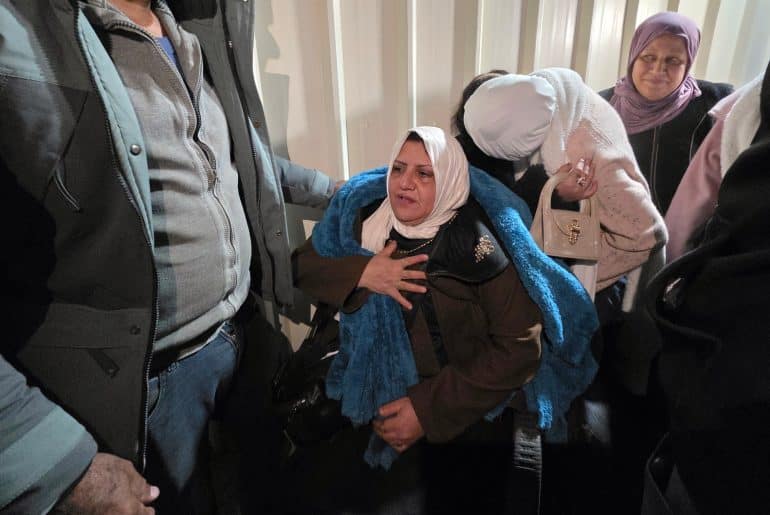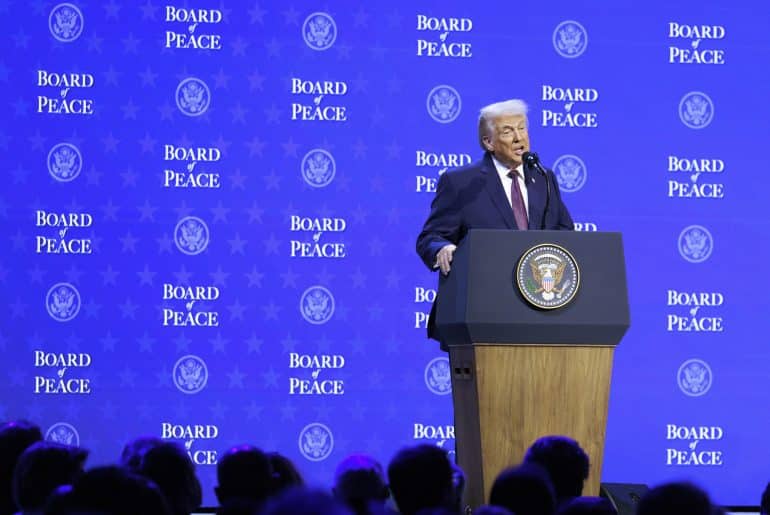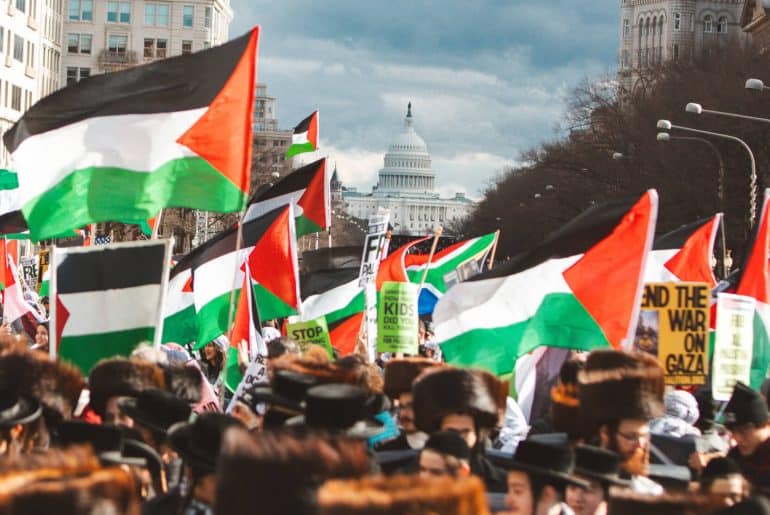Following months of large-scale protests, extensive outreach to alders, and organized efforts by pro-Palestinian advocates, on January 31, Chicago became the largest U.S. City to pass a resolution calling for a ceasefire in Gaza.
The highly anticipated final vote on Alderman Daniel La Spata’s resolution stood at a deadlock, with both 23 yeas and 23 nays, when Mayor Brandon Johnson exercised his vote to break the tie, successfully passing the resolution. Cheers erupted on the balcony floor and across the city hall lobby as the public listened along to the live recording of the city hall meeting session.
Amid heightened anticipation for the day, hundreds gathered as early as 8:00 a.m. at city hall. The meeting began with a series of public comments made by both pro-Palestinian advocates and Zionist contingents, followed by addresses made by the City Council Alders. The overwhelming majority of the public spoke out in support of Palestine.
Numerous calls to maintain decorum and withhold responses were made to the public sitting in the chambers, which La Spata acknowledged in his own address, “I appreciate the calls for restraint and respect, the calls for respectfulness and civility. I cannot imagine how I personally would feel capable of that with what you guys have, with what you have witnessed, with how those you love have hurt. You impress me with your courage every single day.”
La Spata told the council a story of a Gazan man that personally affected him, “I read one story yesterday of a woman who prayed with her husband and asked him to pray that he would live to see his daughter grow up. And he couldn’t say that prayer because he didn’t believe it could happen and he is dead now and is buried in a mass grave. And if it was only for him or only for any one of you, I would still cast this vote.”
“Do I believe that the words that we speak today and how we vote today influences directly international policy? I don’t, I don’t have those illusions, but we vote with hope. We vote with solidarity. We vote to help people feel heard in a world of silence,” emphasized La Spata.
Directly after La Spata spoke, Ald. Debra Silverstein was called to speak in her turn. Silverstein had led the charge against the resolution, and as she stood, the group of the pro-Israel contingent sitting behind her cheered for her.
Silverstein began immediately by stating, “I stand in opposition to this resolution. Today is 116 days since the October 7th terrorist attack. 116 days since 1200 innocent Israelis were murdered and 240 people were kidnapped. For 116 days, those hostages have been living in hell. 116 days they have suffered kidnapping, abuse, depravation, and rape. 116 days, they’ll have been waiting for the world to stand up for them and say their lives matter. That Jewish lives matter, too. 116 days is way too long.”
Silverstein went on to recount many of the now debunked atrocities that allegedly took place on October 7. This stirred outrage and horror among several members of the public and those listening in in the lobby. This rhetoric mirrored much of what Silverstein had expressed on October 13 during the city hall meeting of the Israeli solidarity resolution, which many in the Muslim and Arab community attribute to the growing anti-Palestinian atmosphere in the Chicago area and around the country. This dangerous rhetoric was magnified by the brutal murder of 6-year-old Wadea Al Fayoume, who was stabbed 26 times by his landlord on October 14 just outside Chicago, and just the day after Silverstein’s original resolution was passed.
As Silverstein continued, commotion ensued in the chambers. The mayor, with no initial warning, immediately called for the sergeant-in-arms to clear the room. “Ladies and Gentleman please exit the room. That means everybody.”
The chambers were cleared, and after a short recess, Silverstein concluded by urging her colleagues to vote against what she deemed a biased resolution and that she would continue to work towards what she deemed a more fair and responsible resolution.
After several alders took their turns to address the resolution, some in support and others in opposition, Alderman Byron Sigcho Lopez, once again wearing his keffiyeh, addressed the council in his speech, “I remind us that we have the largest Palestinian community in the country here in Chicago, and we also have a responsibility equally important to preserve their safety. I am extremely proud of our Chicago Public School youth and our students for seeing the obvious. For seeing what’s right. To practice what they are hearing and learning.”
Chicago Public Students had staged a large-scale demonstration and march to City Hall the day prior, urging their alders to sign on to the resolution and voicing their concerns regarding Palestine.
“And this, of course, is a resolution that is not controversial,” Lopez continued. “I think some of the arguments here on the floor defy some logic. When we’re talking about a resolution that does three simple things, number one: a ceasefire, I think that is not a controversial position, in fact, as one of my colleagues just said, there are already efforts on the way to reach a ceasefire. The council is actually acting upon our responsibility with the Palestinian constituents. We are almost in the fourth month of a brutal war and slaughter, what the international courts are investigating as a genocide.”
Jessie Fuentes spoke after Lopez, sharing how her lived experiences as a Puerto Rican and Cuban informed her vote. “My grandmother was also a victim of Operation Bootstrap where she was forced to no longer have children as a form of population control in Puerto Rico,” Fuentes said. “My first national political act was to go to Vieques to demand the navy stop bombing the very land that Puerto Ricans lived on, a place that has the highest rates of cancer today. Because of the testing of those bombs on our land. That Colonial experience that fights for freedom and self-determination, the desire to just want to be able to live in a place that we love so much without being displaced is what informs my solidarity with Palestinians.”
Rosanna Rodriguez Sanchez followed Fuentes and shared a similar message,
“I’ve been thinking a lot about how the situation in the process of working in this resolution became deeply personal to me and some of it for the same reasons that my colleague of the 26th Ward [said]. I am Puerto Rican. I lived under colonialism. I had to do civil disobedience in Vieques to prevent 9,000 people from continuing to be bombed by the U.S. Navy. We also went through Hurricane Maria and we saw the bodies piling up because of the lack of water. We are the colony of the most powerful country in the world, with the most powerful army in the world, and they let 5000 people die of preventable causes.”
“I remember how outraged everybody was when Trump showed up to Puerto Rico and threw paper towels at my people. People were incredibly disturbed by that behavior so when our governments don’t do what they need to do, we do need to speak up. We have that responsibility towards people to say that we don’t want any more war and that it is time to protect lives. That babies don’t deserve to die. There are 50,000 pregnant women in Gaza right now they’re giving birth in tents. They’re having complications. There is no food.”
“Yes, we have many issues in Chicago that need our attention and I believe we can make space for all of them. We can continue doing the work of implementing treatment, not trauma… We can continue to work on caring for all our neighborhoods and also make space to tend to our communities at a moment of such intense pain and devastation. I don’t want the city that I love so deeply to go down in history as the one who are silent on a whole nation of colonized people being destroyed, and as innocent people were being bombed. I really hope that as the council we can support this resolution and I am also ready to work with all of you thank you very much.”
The voting for the resolution commenced at the end of Ald. Rosanna Rodriguez Sanchez’s speech was followed by its subsequent passing due to the mayor’s tie-breaking vote.
Hundreds continued to cheer as Alderman Lopez also made his way down to the lobby to which the crowd began to cheer his name chanting, “Byron! Byron!” The groups exited the building and continued their ‘celebratory protest,’ as they referred to it, and marched from City Hall to the Daley Plaza.
The crowd took the time to listen to and hear the many voices that worked in support of the resolution, including Alderpersons Rosanna Rodriguez Sanchez, Jessie Fuentes, Byron Sigcho Lopez, Carlos Ramirez Rosa, Julia Ramirez, the Chicago Progressive Staffers — a coalition of progressive staffers from the mayor’s office and city council, Sabha Abour, and representatives from various ally organizations.
Lopez spoke to the crowd, “Today is just the beginning. It’s a victory for the people. And we were here just this last weekend, we were talking about committing to justice in our fight for people everywhere. Chicago today gave an example to the country, that [one of] the biggest cities in the country, a city that has been plagued with segregation, surveillance, disinvestment, violence — today Chicago made history without shooting one bullet.”
Mufid Isa, a Palestinian American and resident of Orland Park, agreed. He waited in line with his wife since 8:00 a.m. to attend the city council hearing.
“For the past three months I have watched my Palestinian blood be diminished in every way. Yet, what helps our cause and continues to persist is the Palestinian liberation movement,” Isa told Mondoweiss. “What we just did in Chicago was a chapter in our history. More states will continue to follow our lead and what we just accomplished. This will create more progression in the cause and help us persist our government to finally call for a ceasefire. It’s not easy, but we will continue to always stand for what we believe in.”
“In the end, I hope President Biden will come to his senses. He could call for a ceasefire today and it can be done. President Biden talked about the loss of American soldiers and how heavy his heart is. Mr Biden, don’t you feel the same way for the 30,000 people that have died in Gaza? That hypocrisy. Are those not human beings?”
Khadija Quadri Al Jilani
Khadija Quadri Al Jilani is a writer, photographer, and graduate student in sociology.



